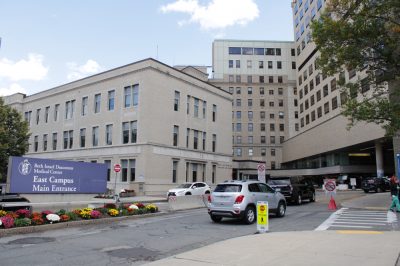
Through a collaboration between Dana-Farber Cancer Institute and Beth Israel Deaconess Medical Center, a plan to build a $1.68 billion cancer hospital in Boston was unveiled last week, exacerbating concerns among patients, their families and employees as they seek to understand how the partnership will impact their lives.
The collaboration with Beth Israel meant Dana-Farber would be leaving their current partnership with Brigham and Women’s Hospital, where Dana-Farber first started leasing beds in the 1990s. This came as a shock to the Brigham, which was reportedly unaware of the move.
“We learned, not from Dana-Farber but through a leak … that they were going to announce on Thursday they were going with Beth Israel,” said Brigham COO Ron Walls in a meeting recording on Sept. 21 obtained by The Daily Free Press.
Walls said in May of this year, Brigham and Dana-Farber had a summit meeting about “getting to work quickly” and to build “a future in cancer together.” In August, the institutions agreed they would complete plans for a “long-term relationship” by the end of September, conversations that Walls said continued until four days before Dana-Farber’s announcement.
“I know that this is disappointing,” said Brigham President Anne Klibanski during the meeting. “We were on track to sign an even longer term agreement, and that was as of the week of the announcement … We had a plan. That was it. Except it wasn’t.”
During the meeting, Brigham faculty mourned the loss of the “powerful and productive” partnership they had with Dana-Farber. But conversation quickly turned to the now.
“We have time to get this right,” Klibanski said, urging her colleagues to put the noise aside. “Clearly, other plans have been made, we need to make our own.”
Since the contract between Dana-Farber and Brigham will continue until 2028, both institutions see this five-year period as time to figure out how to continue providing cancer care despite changing circumstances. Until the contract ends, the two will continue their current affiliation through the transition.
“Nothing is changing today,” a Dana-Farber spokesperson said in an email statement. “We have deep respect and profound appreciation for our BWH colleagues, and we are confident that we will continue to work together to provide an exceptional patient experience.”
Dana-Farber cited the reason for ending its relationship with Brigham as a misalignment in visions for the future, specifically in building a cancer-only hospital. In Brigham’s meeting, Chief of Surgery Gerard Doherty said their future cancer care model will include new facilities, but will continue to embed cancer care in acute care hospitals.
“Patients with cancer don’t only have cancer, they have heart disease, liver disease and kidney disease and they need all different kinds of specialists to provide the best care, we think that’s the best model,” Doherty said.
Dana-Farber believes in creating specialized cancer centers, according to a Boston Globe op-ed written by their president Laurie Glimcher and Beth Israel CEO Kevin Tabb.
“We do know that both patient care and patient experience improve with dedicated centers built around unique service lines,” said Ali Baaj, a spinal surgeon at the University of Arizona, when asked about this approach. “Oncological care, in particular, poses unique challenges that are likely better met with a dedicated cancer center.”
Despite differing theories, all institutions involved — Dana-Farber, Beth Israel and Brigham — have stressed that their patients remain at the forefront amidst moving parts. Representatives of both Dana-Farber and Brigham have said they have contingency plans if the contract ends and the new hospital has yet to be built.
“This is most difficult for patients,” said Giles Boland, president of Brigham and Women’s Physicians Organization, during the meeting. “We feel for patients now, and the many conversations I’m sure you already are having with patients about what this may mean for them.”
Virginia Lewis, a patient at the Brigham who has received care from Dana-Farber, voiced concern over the motivations behind the split.
“Dana-Farber has saved my life in the past … but I feel very strongly that [the split is] all about money,” Lewis said. “It’s disheartening to see.”
Lewis questioned why Dana-Farber did not try to preserve both affiliations, or have other hospitals in the area contribute to the new cancer center.
The story has stirred Boston’s health industry over the past month, but it’s far from the only problem it faces. Alan Sager, a professor at Boston University’s School of Public Health, said the “main healthcare story” is that Boston has some of the most expensive healthcare in the world.
“We have to focus much more attention on the floor, the basics of healthcare, than on whether it’s the BI or the Brigham that has its name on the door of the hospital where patients get cancer care,” Sager said.




















































































































